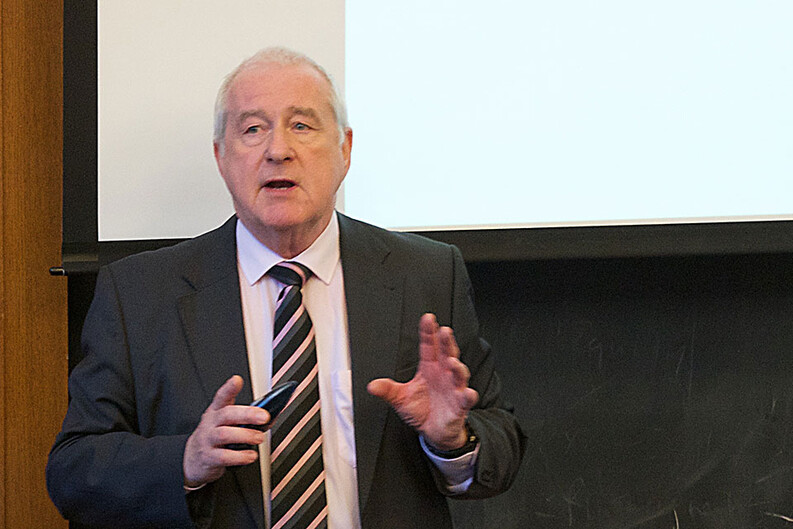Guy Goodwin-Gill Discusses International Refugee Regime

On Wednesday, October 4, Professor Guy Goodwin-Gill visited Yale Law School to speak about international refugee law in an event sponsored by the Schell Center. His talk, titled “The International Refugee Protection Regime Under Threat: Are the Global Compacts the Way Ahead?,” covered the past, present, and future of international refugee protection.
Goodwin-Gill has held academic appointments across the globe and is currently a Professor of Law and the Acting Director of the Andrew & Renata Kaldor Centre for International Refugee Law at the University of New South Wales. He previously spent twelve years working as an advisor for the United Nations High Commissioner for Refugees (UNHCR).
Goodwin-Gill began his talk by discussing the first international refugee protections, which were provided by the League of Nations and originally extended only to Russian refugees. Goodwin-Gill acknowledged that these protections were of a limited scope, but he argued that aspects of them are worth revisiting. For example, he lauded the fact that the definition of a refugee used at the time was more expansive than today’s, which does not encompass individuals displaced by climate change, famine, or war.
The apparatus for international refugee protection, Goodwin-Gill explained, later developed into the International Refugee Organization and then the UNHCR. He particularly focused on the UNHCR and the threats that it faces today, such as states’ failure to equitably share the responsibility for supporting refugees. Goodwin-Gill lamented that most states hold that they have no obligation to refugees outside of their territories: “That sort of unilateralist approach is all too common,” he said.
The solution to this and other problems with the international refugee protection regime, Goodwin-Gill indicated, may lie in the recent “New York Declaration for Refugees and Migrants.” Intended to ensure the protection of all those “on the move,” including migrants, asylum seekers, and refugees, the Declaration is composed of two Global Compacts. Goodwin-Gill contends that the first, which addresses refugees, has the potential to solve many of the problems he raised; crucially, it provides a detailed framework for responsibility-sharing. The second compact, which covers migrants, is less comprehensive. This discrepancy reflects the fact that states “want unilateral power to determine which migrants can come in and out,” Goodwin-Gill explained.
Do the Global Compacts truly represent the way ahead for international refugee protection? While they are certainly a step forward, Goodwin-Gill suggested, whether they will actually foster international collaboration remains to be seen. “The answer is political will,” he said. “But that has always been the answer, you just have to find it.”


